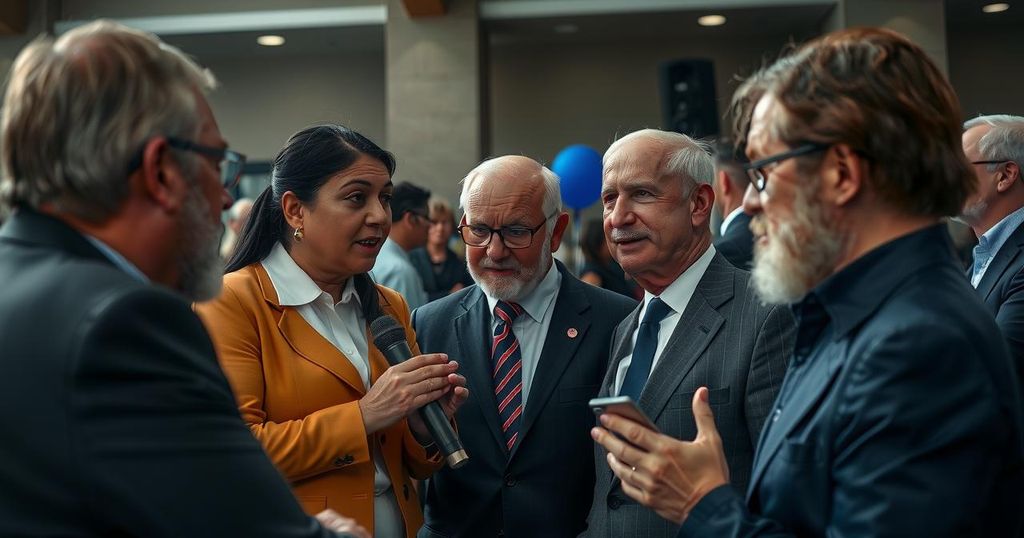Muslim Americans Shift Towards Third-Party Voting in Presidential Election
Muslim Americans are increasingly choosing to vote for third-party candidates like Jill Stein in the upcoming presidential election, expressing discontent with the Democratic Party’s policies, particularly regarding foreign policy in the Middle East. This trend highlights a shift towards seeking representation that aligns with their values, especially concerning Palestinian issues, as voters aim to make principled stands rather than simply opting for the perceived lesser evil. Many are prepared to face any consequences of casting votes for candidates outside the two-party system as a form of moral and political accountability.
In the upcoming United States presidential election, a notable shift is observed among Muslim Americans who are leaning towards third-party candidates rather than supporting the Democratic establishment, heavily influenced by their dissatisfaction with mainstream political rhetoric and policies. Saad Husain, a 62-year-old resident of Canton, Michigan, illustrates this sentiment, revealing his decision to vote for Jill Stein of the Green Party, deviating from his previous votes for Democrats in the last two elections. Many in the Muslim community express that the landscape of fear-instilling politics and disingenuous party promises has prompted them to seek an alternative political voice that aligns more closely with their values, particularly regarding issues such as foreign policy in the Middle East and support for Palestine. Husain’s choice, representative of a larger trend, reflects the urgency of casting discerning votes in swing states. A recent survey by the Council on American-Islamic Relations revealed a significant fraction of Muslim voters in Michigan favor third-party candidates to express their discontent with the Democratic Party’s approach to the Israeli-Palestinian conflict. Concerns over military support to Israel during the ongoing Gaza conflict have led Muslim voters, like Javeria Farooqi from Florida, to prioritize moral accountability over political strategy, asserting that her fear revolves around moral repercussions rather than the hypothetical effects of a Trump presidency. Despite concerns about the potential return of Donald Trump, several Muslim voters assert their commitment to third-party candidates not necessarily for a viable win but as an act of principle and resistance against perceived complicity in injustices. Other voices, such as Nazia Kazi and Zakir Siddiqi, also echo sentiments of disillusionment with both major parties, arguing that neither ultimately serves the interests of the justice for Palestinians. They are advocating for a shift away from traditional voting patterns, demanding recognition for the ramifications of military policy both domestically and abroad. Rania Masri from North Carolina highlights the psychological toll that voting for an undesired candidate imposes, drawing attention to the historical and ongoing suffering of Palestinian individuals under current U.S. foreign policies. This collective shift among Muslim American voters, while not singularly aimed at facilitating a Trump victory, demonstrates a significant assessment of what representation should encompass, invoking calls for a political landscape that genuinely acknowledges the voices of marginalized communities. Community leaders have united, advocating that Muslim Americans reclaim their votes through the third-party pathway, and emphasizing the influence and necessity of diverse political representation in shaping the future of democracy. With the election nearing, the stance of Muslim voters encapsulates a broader demand for accountability and change amid the political status quo that has frequently sidelined their concerns. As these voters prepare to cast their ballots, they are not just voting for a candidate, but are making a principled stand for their beliefs and the justice they wish to see, resonating through their support for candidates like Stein. As the election unfolds, it remains to be seen what impact this potential shift in voting patterns among Muslim Americans will have, both on the immediate results and the longer-term landscape of American electoral politics, particularly with issues surrounding foreign policy and minority rights at the forefront.
The article discusses the shift among Muslim American voters, particularly in swing states, towards third-party candidates during the upcoming U.S. presidential election. It highlights the frustration with the Democratic Party’s foreign policy, especially regarding Israel and Palestine, which has prompted some Muslim voters to reconsider their traditional support. Voters express a desire for representation that aligns with their values rather than being coerced into supporting candidates they perceive as complicit in injustices. The article provides insights into individual stories reflecting a collective sentiment among the Muslim community in the U.S.
In conclusion, the sentiment among Muslim American voters this election cycle signifies a pivotal moment of reevaluation of their political engagements. Their inclination toward third-party candidates underlines a desire for representation that resonates with their values, particularly in light of U.S. policies affecting people in Palestine. As they prepare to exercise their voting rights, this demographic is not only reconsidering the implications of their choices but advocating for a political future that advocates for justice and accountability.
Original Source: www.middleeasteye.net




Post Comment